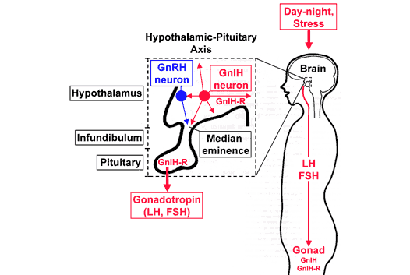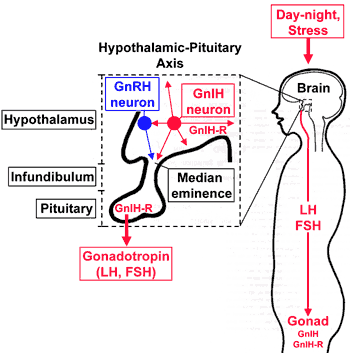New human reproductive hormone could lead to novel contraceptives
Given the ubiquity of fertility clinics and the popularity of in vitro fertilization, one would think that doctors fully understand the reproductive system. It's surprising, then, that a new reproductive hormone has been discovered in humans, one that supresses fertility. The discovery by UC Berkeley neuroscientists could lead to new contraceptives and treatments for cancer and disorders such as precocious puberty.

December 22, 2009
Nearly 10 years after the discovery that birds make a hormone that suppresses reproduction, University of California, Berkeley, neuroscientists have established that humans make it too, opening the door to the development of a new class of contraceptive and possible treatments for cancer or other diseases.

Though newly discovered in humans, gonadotropin-inhibitory hormone (GnIH) has been studied for nearly 10 years in birds and mammals. Scientists have mapped out the hormone’s influence on the regions of the brain critical to reproduction, including its regulation of gonadotropin-releasing hormone (GnRH) and the eventual release of gonadotropin. GnIH also influences the pituitary gland directly. UC Berkeley researchers recently discovered that stress affects levels of GnIH, explaining the drop in fertility attributable to stress. (Takayoshi Ubuka/UC Berkeley)
The hormone, gonadotropin-inhibitory hormone (GnIH), has the opposite effect from gonadotropin-releasing hormone (GnRH), a key reproductive hormone. While GnRH triggers a cascade of hormones that prime the body for sex and procreation, GnIH puts a brake on the cascade.
“Identifying the inhibitory hormone in humans forces us to revise our understanding of the control mechanism of human reproduction,” said first author Takayoshi Ubuka, a post-doctoral fellow in the UC Berkeley Department of Integrative Biology and in the Helen Wills Neuroscience Institute. “We hope this will stimulate clinical studies on people with precocious puberty or in the area of contraception.”
Because reproductive hormones often promote the growth of cancer cells, GnIH might also work as an anti-cancer agent.
“Frequently, treatment of hormone-responsive cancers involves GnRH antagonists or very, very high doses of GnRH, which cause side effects,” said George Bentley, UC Berkeley assistant professor of integrative biology. “Maybe we can use something that inhibits reproduction at physiological levels, so that we can bypass some of these side effects.”
Ubuka, Bentley and their colleagues at UC Berkeley, Japan and the United Kingdom report their findings in the Dec. 22 online issue of the public access journal PLoS ONE.
GnIH was discovered in 2000 in quail and has since been studied in other birds, mice and sheep, but its role in humans has been hard to pin down. While the human genome contains the gene for GnIH, it was unclear if, when and where the protein hormone is produced, and whether it affects reproduction.
The UC Berkeley researchers extracted two versions of the hormone from the hypothalamus regions of five human brains. Not only does the hypothalamus, a brain region that controls reproduction, contain the hormone, but they found that it and the pituitary gland have receptors for the hormones. They established that the human GnIH gene produces a precursor protein that is cut up to form 12 and 8 amino acid mature peptides.
“One of the peptides in sheep has the same amino acid sequence as the human peptide, so we can study its activity in sheep to learn about its activity in humans,” Bentley said. “It’s likely that the function of GnIH is evolutionarily conserved.”
They also showed that GnIH affects nerve cells that secrete GnRH, which is in line with previous findings that GnIH down-regulates GnRH.
All the previous work on birds, rodents, sheep and even macaque monkeys – much of it performed by Bentley’s group and by a group led by the discoverer of GnIH, Kazuyoshi Tsutsui at Waseda University in Tokyo – hint at a wealth of interactions between GnIH and the reproductive system. Only recently, the human hormone was shown to inhibit the release of gonadotropin in sheep.
“GnIH pushes the pause button on reproduction, but in a variety of ways,” Bentley said. “It can act on GnRH neurons in the hypothalamus, inhibiting GnRH release; it can act directly on the pituitary gland; or it can influence the gonads directly. The overall effect is to inhibit reproduction, but at different levels of the reproductive axis.”
GnIH might even be a key regulator of puberty, Ubuka said.
Bentley and Ubuka continue to investigate how GnIH acts in humans as well as in starlings and zebra finches.
Other coauthors of the PLoS ONE paper are Kevin Morgan, Adam J. Pawson and Robert P. Millar of the Centre for Reproductive Biology at The Queen’s Medical Research Institute in Edinburgh, Scotland; Kazuyoshi Tsutsui, Tomohiro Osugi and Vishwajit S. Chowdhury of Waseda University; and Hiroyuki Minakata of the Suntory Institute for Bioorganic Research in Osaka, Japan.
The work was funded by the Hellmann Family Foundation, the National Science Foundation and a UC Berkeley COR Junior Faculty Research Grant.